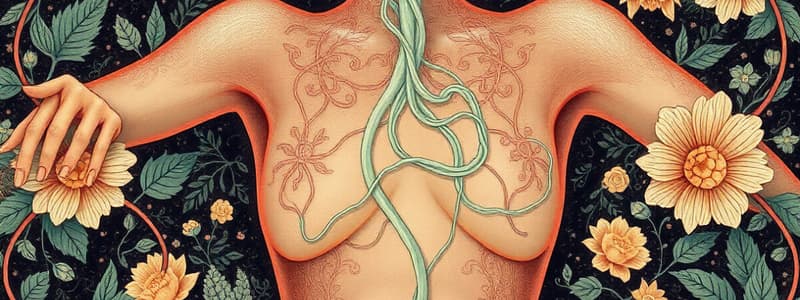Podcast
Questions and Answers
What is the largest reservoir of body water?
What is the largest reservoir of body water?
- Urinary bladder
- Cells (correct)
- Cardiovascular system
- Digestive tract
Why are the extracellular and intracellular fluids referred to as 'fluid compartments'?
Why are the extracellular and intracellular fluids referred to as 'fluid compartments'?
- They are separated by specific structural boundaries. (correct)
- They are in communication but can maintain different internal compositions. (correct)
- Because they receive water from different sources.
- They can be regulated independently of each other. (correct)
The movement of the fluid in the capillary bed is the result of:
The movement of the fluid in the capillary bed is the result of:
- Osmotic pressure
- The electrochemical gradient
- Hydrostatic pressure
- Osmotic and hydrostatic pressure (correct)
Which is the best definition of osmotic pressure?
Which is the best definition of osmotic pressure?
Water that filters from the capillaries into the interstitial fluid...
Water that filters from the capillaries into the interstitial fluid...
The extracellular (ECF) and intracellular fluids (ICF) are in osmotic equilibrium. This implies all of the following, EXCEPT:
The extracellular (ECF) and intracellular fluids (ICF) are in osmotic equilibrium. This implies all of the following, EXCEPT:
Which of the following can be directly measured?
Which of the following can be directly measured?
What is the role of the hypothalamus in regulating water balance?
What is the role of the hypothalamus in regulating water balance?
Dehydration (water depletion) and water intoxication (excess water intake) have the most direct effect on the extracellular fluid concentration of which ion?
Dehydration (water depletion) and water intoxication (excess water intake) have the most direct effect on the extracellular fluid concentration of which ion?
What constitutes an effective buffer?
What constitutes an effective buffer?
Which ion plays a major part in haemostasis (blood clotting)?
Which ion plays a major part in haemostasis (blood clotting)?
Which physiological factor initiates haemostasis?
Which physiological factor initiates haemostasis?
What is the consequence of platelet activation?
What is the consequence of platelet activation?
Why does whole blood in the intact circulatory system not clot?
Why does whole blood in the intact circulatory system not clot?
Clotting disorders cause:
Clotting disorders cause:
Which of the following is NOT part of the NON-SPECIFIC immune defenses?
Which of the following is NOT part of the NON-SPECIFIC immune defenses?
Innate immunity is:
Innate immunity is:
Immunity can be acquired by all of the following ways EXCEPT:
Immunity can be acquired by all of the following ways EXCEPT:
All of the following are part of the first line of defense against invaders EXCEPT:
All of the following are part of the first line of defense against invaders EXCEPT:
Allergy involves an excessive immune response against:
Allergy involves an excessive immune response against:
Flashcards are hidden until you start studying
Study Notes
Body Fluids and Circulation
- Water makes up 60% of the human body weight. The largest reservoir of body water is the cells (intracellular fluid)
- Extracellular and intracellular fluids are compartments with different internal compositions.
- Movement of fluid in the capillary bed is driven by hydrostatic and osmotic pressures.
- Osmotic pressure is the force that moves water across a semipermeable membrane to eliminate a concentration gradient
- Water that filters from the capillaries into the interstitial fluid re-enters the bloodstream directly or via the lymphatic system.
- Extracellular fluid and intracellular fluids are in osmotic equilibrium with equal osmotic pressures but different concentration of solutes
- Total body water can be measured directly but not extracellular or intracellular fluid.
- The hypothalamus regulates water balance by:
- Controlling drinking behaviour
- Controlling ADH release
- Monitoring blood plasma osmolarity
- Both dehydration and water intoxication directly affect sodium (Na+) concentration in the extracellular fluid
- An effective buffer is an ion that can absorb excess H+ ions to prevent pH changes
- Calcium (Ca2+) plays a major role in haemostasis (blood clotting).
- Haemostasis starts with platelet activation, which makes them sticky and promotes adhesion to injured tissues.
- Endogenous inhibitory mechanisms prevent clotting in the intact circulatory system
- Clotting disorders cause excessive bleeding.
- Non-specific immune defenses include:
- Inflammation
- Skin
- Natural killer cells
- Innate immunity is inherited and evoked by pathogens.
- Acquired immunity can be obtained through:
- Natural active (contact with the disease)
- Natural passive (maternal antibodies)
- Artificial (immunisation)
- The first line of defense against invaders includes:
- Skin
- Tears
- Saliva
- Allergies are excessive immune responses against innocuous substances.
Studying That Suits You
Use AI to generate personalized quizzes and flashcards to suit your learning preferences.




